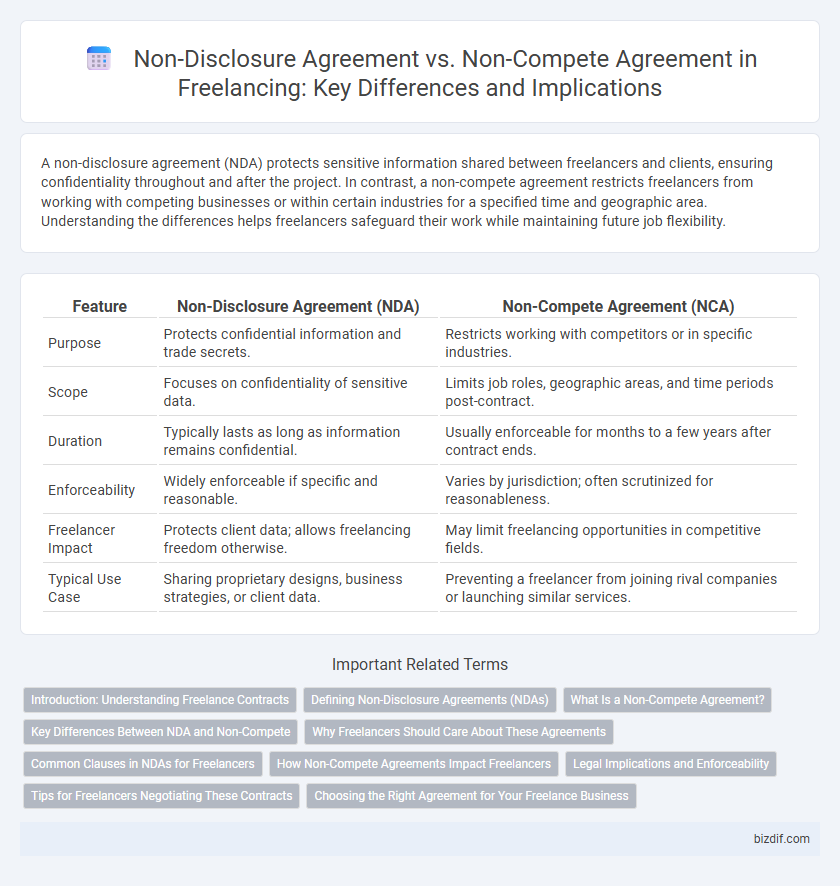A non-disclosure agreement (NDA) protects sensitive information shared between freelancers and clients, ensuring confidentiality throughout and after the project. In contrast, a non-compete agreement restricts freelancers from working with competing businesses or within certain industries for a specified time and geographic area. Understanding the differences helps freelancers safeguard their work while maintaining future job flexibility.
Table of Comparison
| Feature | Non-Disclosure Agreement (NDA) | Non-Compete Agreement (NCA) |
|---|---|---|
| Purpose | Protects confidential information and trade secrets. | Restricts working with competitors or in specific industries. |
| Scope | Focuses on confidentiality of sensitive data. | Limits job roles, geographic areas, and time periods post-contract. |
| Duration | Typically lasts as long as information remains confidential. | Usually enforceable for months to a few years after contract ends. |
| Enforceability | Widely enforceable if specific and reasonable. | Varies by jurisdiction; often scrutinized for reasonableness. |
| Freelancer Impact | Protects client data; allows freelancing freedom otherwise. | May limit freelancing opportunities in competitive fields. |
| Typical Use Case | Sharing proprietary designs, business strategies, or client data. | Preventing a freelancer from joining rival companies or launching similar services. |
Introduction: Understanding Freelance Contracts
Freelance contracts often include non-disclosure agreements (NDAs) and non-compete agreements to protect clients' sensitive information and business interests. NDAs legally bind freelancers to confidentiality, ensuring proprietary data, project details, and trade secrets remain secure. Non-compete agreements restrict freelancers from working with direct competitors or engaging in similar projects, preventing conflicts of interest and market competition.
Defining Non-Disclosure Agreements (NDAs)
Non-Disclosure Agreements (NDAs) in freelancing are legal contracts designed to protect sensitive information shared between parties, ensuring confidentiality throughout and after the project. NDAs restrict freelancers from disclosing proprietary data, trade secrets, or client details to third parties, safeguarding intellectual property and competitive advantage. Unlike non-compete agreements, NDAs focus solely on secrecy rather than limiting future work opportunities within the same industry.
What Is a Non-Compete Agreement?
A non-compete agreement restricts freelancers from engaging in similar work or collaborating with direct competitors for a specified time and geographic area after their contract ends. This type of contract aims to protect the client's business interests by preventing the freelancer from sharing trade secrets or tapping into the client's customer base. Unlike a non-disclosure agreement, which solely focuses on confidentiality, a non-compete agreement limits professional opportunities to reduce competition.
Key Differences Between NDA and Non-Compete
A Non-Disclosure Agreement (NDA) primarily protects confidential information shared between parties during a freelancing project, ensuring sensitive data is not disclosed to unauthorized entities. In contrast, a Non-Compete Agreement restricts a freelancer from engaging in business activities that directly compete with a client for a specified time and geographic area after the contract ends. NDAs emphasize confidentiality and intellectual property protection, whereas non-compete agreements focus on limiting competitive behavior and market competition post-engagement.
Why Freelancers Should Care About These Agreements
Freelancers should care about non-disclosure agreements (NDAs) and non-compete agreements because NDAs protect sensitive client information and trade secrets, ensuring confidentiality and fostering trust in professional relationships. Non-compete agreements can limit a freelancer's ability to work with competing clients or within certain industries, potentially restricting income opportunities and career growth. Understanding these agreements helps freelancers negotiate terms that safeguard their rights while maintaining flexibility in their freelance business.
Common Clauses in NDAs for Freelancers
Common clauses in NDAs for freelancers typically include obligations of confidentiality, defining the scope of confidential information, and specifying the duration of confidentiality duties. These agreements often detail exclusions such as information that becomes public or was independently developed by the freelancer. Remedies for breach, including injunctive relief and damages, are also standard clauses to protect the client's intellectual property and sensitive data.
How Non-Compete Agreements Impact Freelancers
Non-compete agreements restrict freelancers from working with competitors or starting similar businesses within a specified time and geographic area, limiting their market opportunities. These contracts can hinder freelancers' ability to diversify clients and grow their career, potentially reducing income streams. Understanding the enforceability and scope of non-compete clauses is crucial for freelancers to protect their professional freedom and negotiate fair terms.
Legal Implications and Enforceability
Non-disclosure agreements (NDAs) primarily protect confidential information by legally binding freelancers to secrecy, with enforceability often depending on clearly defined terms and jurisdictional variations. Non-compete agreements restrict freelancers from engaging in competing businesses within certain timeframes and geographic areas, facing stricter scrutiny due to limitations on professional mobility and varying enforceability across states. Courts generally favor NDAs over non-competes because NDAs safeguard proprietary information without unduly restricting future work opportunities, making legal implications critical for freelancers to consider before signing either agreement.
Tips for Freelancers Negotiating These Contracts
Freelancers should carefully review non-disclosure agreements (NDAs) to understand the scope of confidential information and ensure that obligations do not extend beyond reasonable project timelines. When negotiating non-compete agreements, clarifying geographic limits and duration helps prevent restrictions that could hinder future opportunities. Consulting a legal professional to customize these contracts safeguards freelancer rights while fostering client trust.
Choosing the Right Agreement for Your Freelance Business
Choosing the right agreement for your freelance business depends on your priorities: a non-disclosure agreement (NDA) protects sensitive information by legally restricting freelancers from sharing proprietary data, while a non-compete agreement prevents freelancers from working with direct competitors for a specified period or within a certain geographic area. NDAs are essential when handling trade secrets, client lists, or confidential project details, ensuring intellectual property remains secure throughout and after the project. Non-compete agreements are more restrictive, often requiring careful legal consideration to balance protecting business interests with fair freelance opportunities.
non-disclosure agreement vs non-compete agreement Infographic

 bizdif.com
bizdif.com